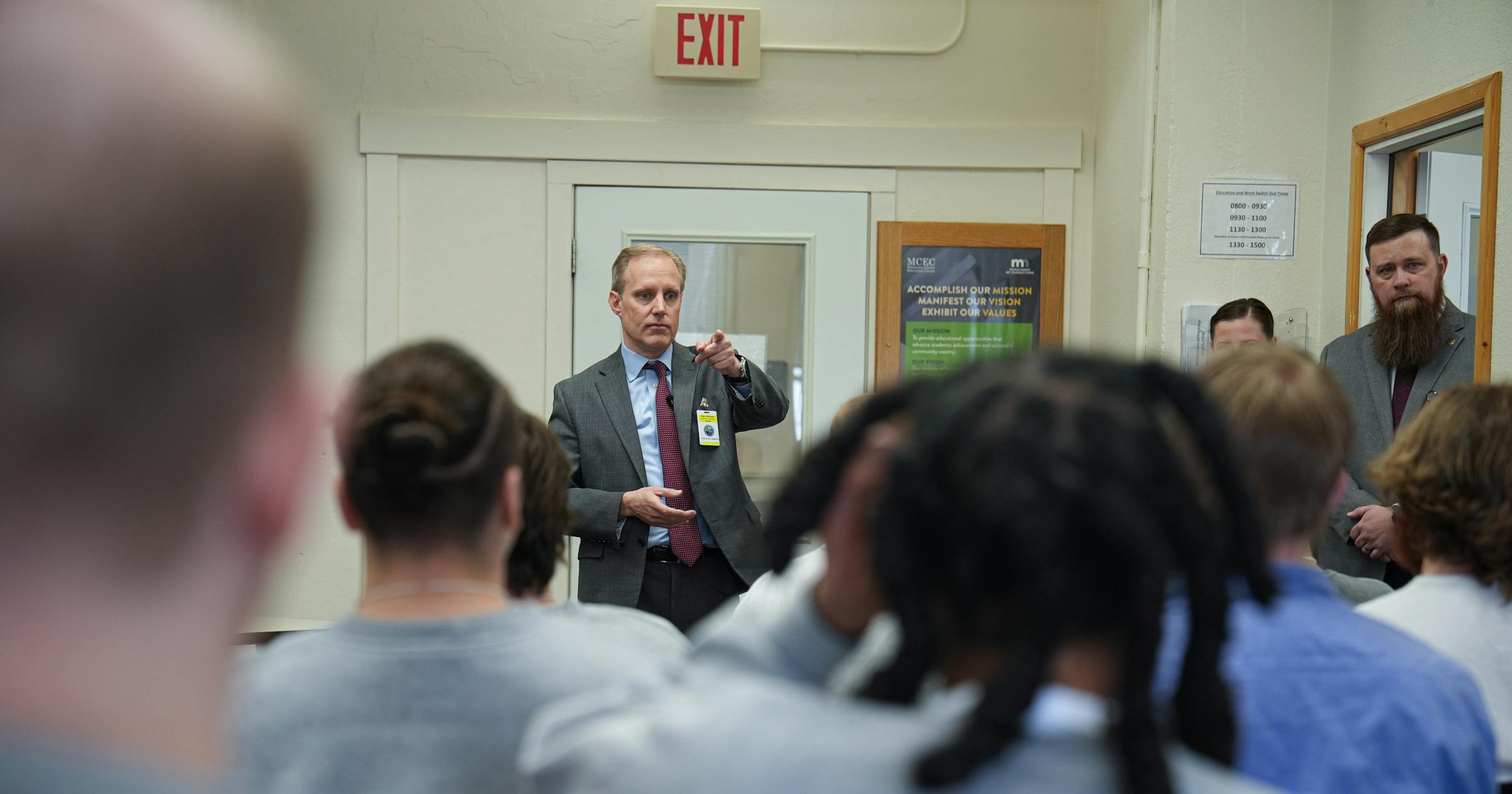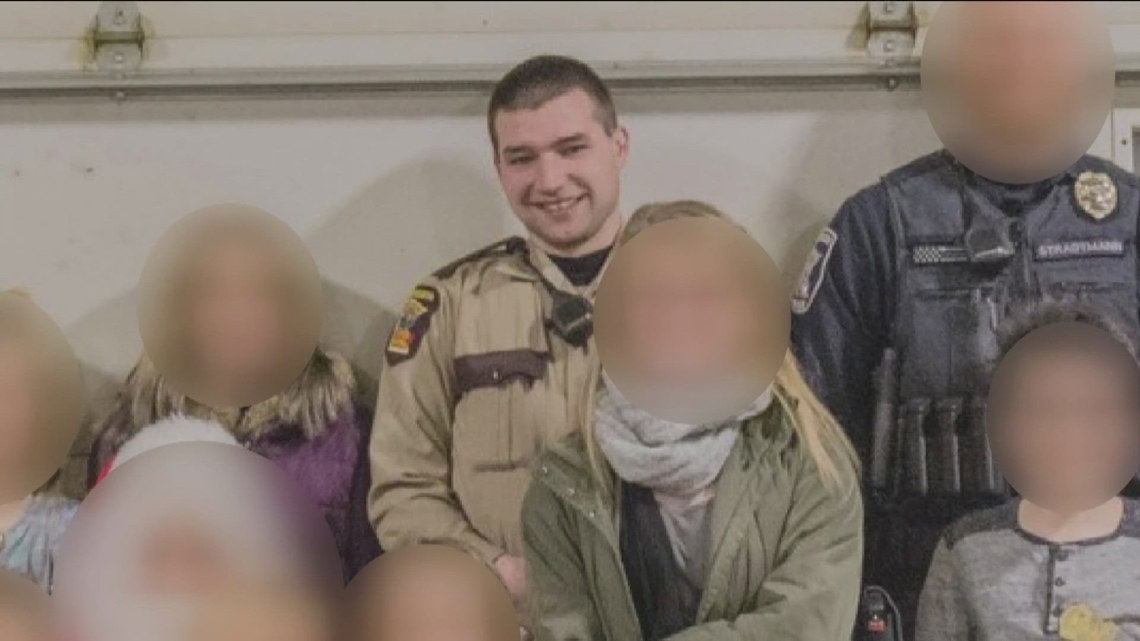Star Tribune
A new law restores voting rights to felony offenders. Minnesota is spreading the word in prisons.

Behind a 22-foot-high granite wall and layers of metal security gates, Minnesota Secretary of State Steve Simon ran through the state’s voter registration rules and how to cast a ballot absentee before Election Day.
His audience: more than a dozen people incarcerated at the Minnesota Correctional Facility in St. Cloud who will soon be released and can vote in the November election under a new state law.
“The minute you step out of here, you get your right to vote back,” Simon told the group, all part of the facility’s re-entry program.
“I know that you’ve all got a big list in your head of other things you’re preparing for or thinking about. I don’t pretend that this is at the top of this list, I just want to make sure it’s on your list.”
The trip is Simon’s second to a correctional facility since Minnesota became the 22nd state in June to give people with a felony conviction their voting rights as soon as they’re released from incarceration. State officials estimate the change will affect 55,000 people in the state, including 500 to 600 people released from the state’s prisons each month.
Previously, those people had to wait to vote until they were off probation and had paid all fines connected to their conviction. Now, a voter registration form is included in their discharge packet and they can register to vote the moment they’re released.
“I’m released on Monday, so I’m good to vote?” inmate Jon Treechee asked Simon, who clarified that he still needed to fill out a registration form, either ahead of the election or using same-day registration on Election Day.
Others wanted to know more about how to cast their ballot early, or if they can still vote if they are out of prison but don’t have a permanent address. When asked if they intended to vote in the fall election, everyone’s hand shot up in the air.
Donald Thomas hasn’t voted in Minnesota for at least eight years and the chance to cast his ballot again is “huge.”
“I can have a say in my future and my kids’ future,” he said.
The new law comes after two decades of advocacy from a coalition of groups that argued prohibiting felons on probation from voting excluded them from being full participants in society, sometimes even decades after they were released from jail or prison.
It was part of a sweeping set of changes to state elections law last year, including automatic voter registration, pre-registering 16 and 17-year-olds to vote and giving Minnesotans the option to join a permanent vote-by-mail list, rather than requesting an absentee ballot each election cycle.
State officials are now in the midst of a public awareness campaign, including efforts to connect with people who were previously incarcerated. The Department of Corrections has provided lists of people who are out of prison but are still “on paper,” or serving probation. Community groups have tried to target those individuals to let them know about their restored voting rights.
“For a lot of the people who are locked up today, it was the voice of those people who went before them, who sat in those very seats, who played a very critical role in this legislation,” he said. “That makes a big difference in terms of empowering these folks.”
Over the last decade, a group of states around the country have chipped away at laws on the books that bar former felons from voting, but some have reversed those rights. Last year, Republican Gov. Glenn Youngkin of Virginia used his executive powers to rescind a policy that automatically restored voting rights to residents who finished their felony sentences.
Simon said that’s bucking a an “unmistakable” bipartisan trend in the other direction.
“I don’t think what Virgina has done is going to stop that.”
Star Tribune
Minnesotans reflect on Biden’s apology

Lt. Gov. Peggy Flanagan and her daughter were among the throngs Friday as President Joe Biden delivered the apology that many Indigenous Americans thought would never come.
“I think he really said the things that people have been waiting to hear for generations, acknowledged just the horror and trauma of literally having our children stolen from our communities,” said Flanagan, a member of the White Earth Band of Ojibwe. “It’s a powerful first step towards healing.”
Hundreds of boarding schools operated in the 19th and 20th centuries, separating Indigenous children from their families and forcing them to assimilate to European ways. Many children were abused, and at least 973 died, according to a report from the U.S. Department of the Interior.
Other Minnesotans reacted similarly to Flanagan, saying they welcomed the apology but that additional action is needed to help Indigenous people move forward.
Anton Treuer, a professor of Ojibwe at Bemidji State University, wrote in a newsletter that the apology was “a welcome first step on the journey to healing.”
“There is no way to truly right historical injustices for the children buried at Carlisle, Haskell, and other schools, but these words set a new tone for the country and will help heal the anguish so many Natives have carried for so long,” Treuer wrote. “It gives me hope that we can come together to reconcile and heal our troubled nation.”
Sen. Mary Kunesh, DFL-New Brighton, the first Indigenous woman to serve in the state Senate, called Biden’s apology encouraging.
“This recognition of past wrongdoings is an important step towards healing relationships between the United States and the sovereign nations affected by these past systems,” Kunesh said in a statement. “This dark period of American history must be remembered and taught.”
Star Tribune
MPD on defensive after man shot in neck allegedly by neighbor on harassment tirade

“I have done everything in my power to remedy this situation, and it continues to get more and more violent by the day,” Moturi wrote. “There have been numerous times when I’ve seen Sawchak outside and contacted law enforcement, and there was no response. I am not confident in the pursuit of Sawchak given that Sawchak attacked me, MPD officers had John detained, and despite an HRO and multiple warrants — they still let him go.”
On Friday, five City Council members sent a letter to Mayor Jacob Frey and Police Chief Brian O’Hara expressing their “utter horror at MPD’s failure to protect a Minneapolis resident from a clear, persistent and amply reported threat posed by his neighbor.”
Council Members Andrea Jenkins, Elliott Payne, Aisha Chughtai, Jason Chavez and Robin Wonsley went on to allege that police had failed to submit reports to the County Attorney’s Office despite threats being made with weapons, and at times while Sawchak screamed racial slurs. Sawchak is white and Moturi is Black.
The council members also contend in their letter that the MPD told the County Attorney’s Office that police did not intend to execute the warrant for “reasons of officer safety.”
At a Friday afternoon news conference at MPD’s Fifth Precinct, O’Hara said police had been working to arrest Sawchak since at least April, but “no Minneapolis police officers have had in-person contact with that suspect since the victim in this case has been calling us.” The chief pointed out that Sawchak is mentally ill, has guns and refuses to cooperate “in the dozens of times that police officers have responded to the residence.”
O’Hara put aside the option to carry out “a high-risk warrant based on these factors [and] the likelihood of an armed, violent confrontation where we may have to use deadly force with the suspect.” The preference, he said, was to arrest Sawchak outside his home, but “in this case, this suspect is a recluse and does not come out of the house.”
Star Tribune
Rochester lands $85 million federal grant for rapid bus system

ROCHESTER – The Federal Transit Administration has green-lighted an $85 million grant supporting the development of the city’s planned Link Bus Rapid Transit system.
The FTA formally announced the grant on Friday during a ceremonial check presentation outside of the Mayo Civic Center, one of the seven stops planned for the bus line. The federal grant will cover about 60% of the project’s estimated $143.4 million price tag, with the remaining funds coming from Destination Medical Center, the largest public-private development project in state history.
Set to go live in 2026, the 2.8-mile Link system will connect downtown Rochester, including Mayo Clinic’s campuses, with a proposed “transit village” that will include parking, hundreds of housing units and a public plaza. The bus line will be the first of its kind outside the Twin Cities — with service running every five minutes during peak hours.
“That means you may not even need to look at a schedule,” said Veronica Vanterpool, deputy administrator for the FTA. “You can just show up at your transit stop and expect the next bus to come in a short time. That is a game changer and a life-transformational experience in transit for those people who are using it and relying on it.”
The planned Second Street corridor is already one of the busiest roads in Rochester, carrying more than 21,800 vehicles a day, and city planners have talked for years about ways to reduce traffic congestion in the city’s downtown. Local officials estimate that the transit line, which will rely on a fleet of all-electric buses, will handle 11,000 riders on its first day of operation and save eight city blocks of parking.
Speaking to a crowd of about 100 people gathered on Friday, Sen. Amy Klobuchar said the project shows Rochester is thinking strategically about how it handles growth.
“If you just plan the business expansion, and you don’t have the workforce, you don’t have the child care, the housing or the transit, it’s not going to work very well as a lot of communities across the nation have found,” Klobuchar said.




